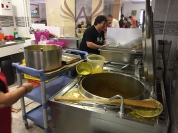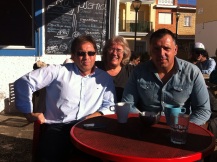First of all it was remiss of me not to thank you all for the lovely thoughts and messages you sent following my heart attack. I really did appreciate every one of them – “the kindness of strangers” means a lot.
Since then I’ve been doing a lot of catching up. Trying to slow down, catching up with old friends, and catching up with long-delayed tasks.
After the last blog, it has been heart-warming how many people have wanted to help Grumpy Norman. I have been offered shoes and books for him; someone even offered to take him out for a meal. I went to see the social worker the week after doing the two passport applications, and somewhat surprisingly received the money for both. The ayuntamiento (town hall) refunded me the cost of Margaret’s application, and Norman  himself had left the money for his (he receives his UK pension into his Spanish bank account). He had also asked the social worker to thank me. I was touched. Leaving her office, the queue for lunch had begun to form and Norman was sitting in the row of chairs for the older residents and those with limited mobility. I gave him three novels and he thanked me profusely, and repeated his thanks about the passport. He’s easier to be with in the mornings, before he pops out for a “coffee” or two.
himself had left the money for his (he receives his UK pension into his Spanish bank account). He had also asked the social worker to thank me. I was touched. Leaving her office, the queue for lunch had begun to form and Norman was sitting in the row of chairs for the older residents and those with limited mobility. I gave him three novels and he thanked me profusely, and repeated his thanks about the passport. He’s easier to be with in the mornings, before he pops out for a “coffee” or two.
 Belén is still working at Los Ángeles Malagueños de la Noche, though mostly supervising from a seated position as she now has only a fortnight or so to go before her baby is born. The appeal for a buggy and baby clothes for her has widened the network of both donors and collectors for Los Ángeles, and now it is not only my little red car that makes the regular journey to the comedor (dining room) to unload sacks of clean second-hand clothes, but two vans as well that collect from the ever-generous extranjeropopulation of the Axarquía.
Belén is still working at Los Ángeles Malagueños de la Noche, though mostly supervising from a seated position as she now has only a fortnight or so to go before her baby is born. The appeal for a buggy and baby clothes for her has widened the network of both donors and collectors for Los Ángeles, and now it is not only my little red car that makes the regular journey to the comedor (dining room) to unload sacks of clean second-hand clothes, but two vans as well that collect from the ever-generous extranjeropopulation of the Axarquía.
At the day centre we are preparing for Christmas, and at the same time preparing to close permanently. With no grant having been forthcoming from the Ayuntamiento de Málaga for four years, the charity is unable to continue funding the Málaga service, when in the other dozen cities across Spain the local council at least contributes towards the costs. The  new volunteers I had recruited to take turns with me running the Tuesday English class (my strategy for cutting down on my commitments) have brought an artistic flair so we are making decorations for a Christmas tree while chatting in English and Spanish with los usuarios (the service-users). The workshops have been successful in attracting some who have not previously participated in anything, which is simultaneously gratifying and frustrating – the day centre is ridiculously cheap to keep open yet its closure will leave people wandering aimlessly during the day instead of writing CVs, applying for training grants, applying for jobs, improving their English, learning bike maintenance, playing football, visiting art galleries, or writing, painting, or sculpting.
new volunteers I had recruited to take turns with me running the Tuesday English class (my strategy for cutting down on my commitments) have brought an artistic flair so we are making decorations for a Christmas tree while chatting in English and Spanish with los usuarios (the service-users). The workshops have been successful in attracting some who have not previously participated in anything, which is simultaneously gratifying and frustrating – the day centre is ridiculously cheap to keep open yet its closure will leave people wandering aimlessly during the day instead of writing CVs, applying for training grants, applying for jobs, improving their English, learning bike maintenance, playing football, visiting art galleries, or writing, painting, or sculpting.
It’s been great to revive my intercambio language exchange meetings with Jose. A  weekly coffee, chat, catch-up and grammar debate, with the beaches of Pedregalejo offering a marker to the changing seasons. Our cafe-bar is quieter, and it is easier to park now that the summer visitors have gone. Over Jose’s shoulder the sea is dramatic, the waves crash in, and the earlier sunset over the cranes of Málaga provides a stunning backdrop.
weekly coffee, chat, catch-up and grammar debate, with the beaches of Pedregalejo offering a marker to the changing seasons. Our cafe-bar is quieter, and it is easier to park now that the summer visitors have gone. Over Jose’s shoulder the sea is dramatic, the waves crash in, and the earlier sunset over the cranes of Málaga provides a stunning backdrop.
Last week David came along too. Good to catch up with him too, after his far-flung postings with the Guardia Civil in Lebanon and Afghanistan. It is fascinating to hear about  his work and the confusions that arise in these multi-national conflict zones where he liaises with military police from many countries, often using English as the common language, but sometimes struggling along in a mixture of half-understood languages. Now back in Melilla he can visit his home in Málaga more often, see his family and his girlfriend, prepare for his next exam, email me his “writings” in English to correct and help me with my “writings” in Spanish.
his work and the confusions that arise in these multi-national conflict zones where he liaises with military police from many countries, often using English as the common language, but sometimes struggling along in a mixture of half-understood languages. Now back in Melilla he can visit his home in Málaga more often, see his family and his girlfriend, prepare for his next exam, email me his “writings” in English to correct and help me with my “writings” in Spanish.
In my Spanish lessons our theme for study and writing was “Refugees and Immigration”. I wrote in Spanish the story of Yousef (1) and of Yousef (2), though I changed Syrian Yousef’s name to Sayid to save confusing the readers. Syrian Yousef is still working in Germany, settled there with his young family. Palestinian Yousef is back home with his wife and child in his village in Palestine, still hoping one day to bring them to Andalucía. We speak regularly, and I really hope we will see each other again one day.
 Facebook and Skype are the link back to the UK. Friends never seem so far away when you know that Zara’s painting has been accepted for an exhibition, Margaret’s Christmas photoshoot went well, Olga’s cat returned safely, and Jane’s Christmas puddings are in the larder.
Facebook and Skype are the link back to the UK. Friends never seem so far away when you know that Zara’s painting has been accepted for an exhibition, Margaret’s Christmas photoshoot went well, Olga’s cat returned safely, and Jane’s Christmas puddings are in the larder.
 And in the callejon in Colmenar we welcomed the rains, much-needed to fill the dreadfully low reservoir. Out come the braseros (flat, round heaters that go under the table, which is then covered with a shaped tablecloth that reaches the ground). My neighbours opposite deal with their latest harvest, and watch the skies with professional interest. The family next door with the coffee ever-ready on the stove drag me in as I pass, to catch up on news and to talk about the weather. Why on earth do we imagine it is only the British who obsess about the weather?
And in the callejon in Colmenar we welcomed the rains, much-needed to fill the dreadfully low reservoir. Out come the braseros (flat, round heaters that go under the table, which is then covered with a shaped tablecloth that reaches the ground). My neighbours opposite deal with their latest harvest, and watch the skies with professional interest. The family next door with the coffee ever-ready on the stove drag me in as I pass, to catch up on news and to talk about the weather. Why on earth do we imagine it is only the British who obsess about the weather?
 The village works its way through the annual cycle of festivals. Indoors, the wood-burning stove has been lit and the winter duvet has been dragged out of storage. Another year meanders towards a close.
The village works its way through the annual cycle of festivals. Indoors, the wood-burning stove has been lit and the winter duvet has been dragged out of storage. Another year meanders towards a close.
© Tamara Essex 2016 http://www.twocampos.com